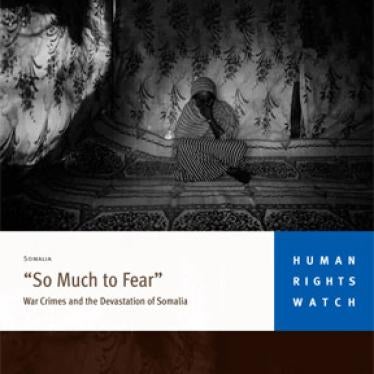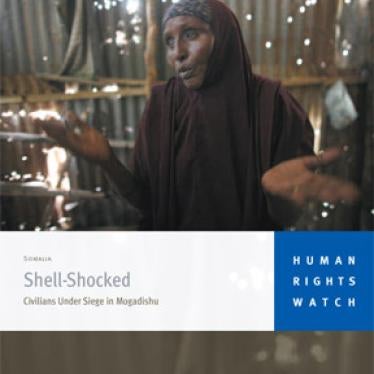(Nairobi) - All parties in the escalating conflict in Somalia have regularly committed war crimes and other serious abuses during the past year that have contributed to the country's humanitarian catastrophe, Human Rights Watch said in a report released today. Human Rights Watch urged the United States, the European Union, and other major international actors to rethink their flawed approaches to the crisis and support efforts to ensure accountability.
The 104-page report, "'So Much to Fear': War Crimes and the Devastation of Somalia," describes how the Somali Transitional Federal Government (TFG), the Ethiopian forces that intervened in Somalia to support it and insurgent forces have committed widespread and serious violations of the laws of war. Frequent violations include indiscriminate attacks, killings, rape, use of civilians as human shields, and looting. Since early 2007, the escalating conflict has claimed thousands of civilian lives, displaced more than a million people, and driven out most of the population of Mogadishu, the capital. Increasing attacks on aid workers in the past year have severely limited relief operations and contributed to an emerging humanitarian crisis.
"The combatants in Somalia have inflicted more harm on civilians than on each other," said Georgette Gagnon, Africa director at Human Rights Watch. "There are no quick fixes in Somalia, but foreign governments need to stop adding fuel to the fire with misguided policies that empower human rights abusers."
Somalia has been without a functioning government since 1991, and a UN peacekeeping operation withdrew in failure in 1995. The years since have been violent and chaotic. In December 2006, Ethiopian military forces intervened to back Somalia's weak TFG against a coalition of Islamic courts that had won control of Mogadishu. In the past two years, the conflict has escalated dramatically, and internationally backed peace talks have failed to make any impact on the ground.
The report draws on interviews with more than 80 witnesses and victims of abuses, who described attacks by all the warring parties in stark detail.
Each party to the conflict has indiscriminately fired on civilian neighborhoods in Mogadishu on an almost daily basis, leveling homes without warning and killing civilians in the streets. Insurgent forces have regularly carried out ambushes and roadside bombings in markets and residential areas, and launched mortars from within densely populated neighborhoods. Ethiopian forces have reacted to insurgent attacks with indiscriminate heavy rocket and artillery fire, with devastating impact on civilians.
TFG security forces and allied militia have tortured detainees, and killed and raped civilians and looted their homes, sometimes in the context of house-to-house joint security operations with Ethiopian troops. Ethiopian forces, who were relatively disciplined in 2007, have been more widely implicated in acts of violent criminality this year. Insurgent forces have threatened and murdered civilians they view as unsympathetic to their cause and have forcibly recruited civilians, including children, into their ranks.
The full horror of these abuses can be captured only through the stories of Somalis who have suffered through them. Human Rights Watch interviewed teenage girls raped by TFG security forces, parents whose children were cut to pieces in their own homes by Ethiopian rockets, and people shot in the streets by insurgent fighters for acts as trivial as working as a low-paid messenger for TFG offices. One young man described watching a group of Ethiopian soldiers rape his mother and sisters in their home. "And I was sitting there helpless," he said. "I could not help my mother or help my sisters."
For many, the worst of it is being caught between all three sides at once. One young man was given an ultimatum by radical Islamist Al Shabaab fighters in his neighborhood to join them or face retribution. Days later, he came home from school to find that his mother had been killed and his house destroyed in an unrelated artillery bombardment.
"The world has largely ignored the horrors unfolding in Somalia, but Somali families are still left to confront violence that grows with every passing day," Gagnon said. "Even those who try to flee find that the violent abuses follow them."
Hundreds of thousands of Mogadishu's poorest residents, lacking the money to travel further, have congregated in sprawling displaced persons camps along the Mogadishu-Afgooye road, but the indiscriminate fighting they fled has followed them there.
Tens of thousands of Somali refugees have also fled the country this year. Kenya's Dadaab refugee camps are now the largest concentration of refugees anywhere in the world, with nearly 250,000 inhabitants. But the journey itself is perilous. Human Rights Watch interviewed many refugees who had been robbed, raped, or beaten by freelance militias as they fled Somalia. Kenya's border with Somalia is closed, leaving refugees at the mercy of abusive smugglers and corrupt Kenyan police.
Hundreds of Somalis have drowned trying to cross the Gulf of Aden to Yemen, often after being forced overboard or abandoned at sea by traffickers.
The United States, the European Union, and governments in the region have taken few positive steps to address the worsening situation in Somalia, and have too often taken actions that have made it worse.
Ethiopia is a party to the conflict, but has done nothing to ensure accountability for abuses by its soldiers. The United States, treating Somalia primarily as a battlefield in the "global war on terror," has pursued a policy of uncritical support for transitional government and Ethiopian actions, and the resulting lack of accountability has fueled the worst abuses. The European Commission has advocated direct support for the transitional government's police force without insisting on any meaningful action to improve the force and combat abuses.
In recent months, the conflict has increasingly spread into neighboring regions and countries in the form of bombings and other attacks - precisely what Ethiopia's military intervention in 2006 sought to prevent. During the latter half of 2008, there have been suicide bombings in the previously more stable semi-autonomous regions of Somaliland and Puntland, as well as rampant piracy on the high seas, and kidnappings across the border in Kenya.
"The Somali crisis is not just a nightmare for its people, it is a regional threat and a global problem," Gagnon said. "The world cannot afford to wait any longer to find more effective ways of addressing it."
Human Rights Watch called for a fundamental review of policy toward Somalia and the entire Horn of Africa in Washington, where the Obama administration will have an opportunity to break with the failed policies of its predecessor, and in European capitals. It also called for the establishment of a UN-sponsored Commission of Inquiry to investigate violations of international law, map the worst abuses, and lay the groundwork for accountability.








